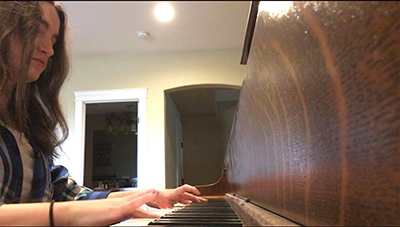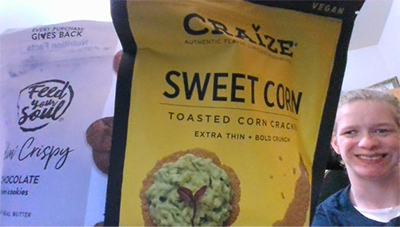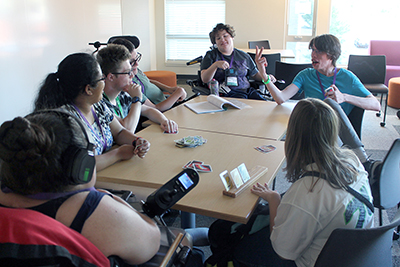Summer Study: What Do Phase I Scholars Do?
This year, DO‑IT Phase I Scholars participated in a three-week Summer Study session. They learned about college life; explored online resources; interacted with peers, staff, and mentors; and had fun. The DO‑IT Scholars program started in 1993 as an experimental project for teens with disabilities nationwide. While it is usually held on campus at the University of Washington, this year it was held online. It is currently open to Washington State teens and is supported by the State of Washington. The DO-IT Scholars program is supported by all DO-IT staff and led by Tami Tidwell, Kayla Brown, and Andrea Mano.
NOTE: We had so many amazing articles this year from Scholars, we are sharing more in our next issue!
Why I’m Interested in Web Design
There are so many resources online, like different games I like to play or tools to help me study for tests. Whenever I have a test coming up, I find websites that explain the information and use online quizzes that help me get ready. I have made my own quizzes using the Kahoot website.
Web design interested me because it would be entertaining and fulfilling to make websites that help people learn and have fun at the same time. We learned to code in Visual Studio, which was challenging but the instructors were helpful and patient. I learned how to change my background, add images and text, and other skills. If I keep studying, I can learn much more. I would love to create websites that have guessing games to help people learn about new things.
How DO-IT Supports Me
DO-IT has done a great job supporting my Attention Deficit Hyperactivity Disorder (ADHD). DO-IT staff provides opportunities to speak up and advocate for myself, and everyone listens and is understanding about different needs.
Staff answer questions quickly and provide a variety of resources. They respect my hobbies, interests, and thoughts. They also help me by providing the tools I’ll need to be successful, such as opportunities to meet with others who have disabilities and learning about accessibility tools. I am glad I am a part of the DO-IT community.
Ballet, Piano Lessons, and Swimming

My Disabilities
I have right hemiparetic cerebral palsy, autism, obsessive compulsive disorder, anxiety, dermatillomania, as well as some other disabilities. Each affects me quite differently, but they do all affect me. I also have a very determined mindset on anything I do, especially when it’s something I’ve been told I can’t do (even though I can). I’ve had many hobbies and interests, and I’ve had a variety of experiences, good and bad, when trying these hobbies with my disabilities.
Ballet
When I was younger, I wanted to take ballet lessons. My mom signed me up and informed the teacher about my disabilities. You’d think that the teacher would be fine hearing about my disabilities, but that didn’t happen. Instead, the teacher told my mom they didn’t have enough slots open—which turned out to be a lie. A couple of hours later, I found out someone else in my neighborhood had just been called and gotten the slot from that same ballet teacher. My mom knew right away that I was discriminated against without even an option to try and see if I could dance.
Piano Lessons
I’ve always loved music, so when my older brother started taking piano lessons, I wanted to learn how to play too. My mom and I weren’t sure whether his teacher would teach me how to play because of my disability, so my mom found a teacher who agreed to give me a shot. I’ve now been playing piano for a decade, and I’m thankful I was given a chance to learn and grow in music.
Swimming
My brothers and I began swimming lessons when we were in elementary school. I joined a club swim team in fifth grade. It was a pretty small team and anyone with swimming experience who wanted to join could. During this time, my weakness on my right side was more visible, and I was pretty weak overall. When we started to go to swim meets, I was extremely anxious, both for the competitive nature of the event and due to how many people would be there. Luckily, I had my parents, brothers, friends, and coaches who helped give me support, and I grew in my skills and confidence.
Two years later, my family moved, and we had to join a different team. This new club team had us try out and asked us to swim all four main strokes (butterfly, backstroke, breaststroke, and freestyle). I got a spot on the team, which was so great. However, since this team was a lot larger, I had a harder time connecting with the coaches and getting help specific to my disability. I had to learn to speak up for myself and began to communicate more with my coaches about how cerebral palsy affects me. I also joined my school team, and in my junior year, I decided to quit the club team and just focus on my school team---this has been the right decision for me because it has allowed me to focus more on school and not overwork myself in swimming. I’ve learned more about how my cerebral palsy affects my disability and how to speak up for myself.
DO-IT’s Evening Activities
The evening activities were my favorite moments from DO-IT. One of my favorite events was our game night. We played Jackbox games; Jackbox is a fantastic game series and is great for parties and other hangouts. Jackbox is one of my favorite games to play with both my online friends and my offline friends, so playing it with the other people in DO-IT was really fun. Another of my favorite activities was movie night. Watching movies together is so much fun and allows me to share things I like with other people. I really enjoyed watching How To Train Your Dragon and getting to discuss it with my fellow Scholars.
My Days of Summer Vacation
During the first days of summer, my brother and I went to a gas station store near my neighborhood. While I was outside waiting for my brother, I saw one of my IEP (individualized education program) organizers from school in his truck. He told me to “have a great summer,” and I tried to do just that.
I thought multiple times about writing a journal about my summer like how I did in 2020 and 2021, but I was so busy, I never got around to it. On June 18th, my family and I went camping to a campsite at Columbus Park that was new to us. We had a lot of fun.
Throughout the summer, we also went to do tons of smaller fun events. we went to see a movie at AMC called Lightyear, and later we went and saw the movie Bad Guys outside of the library. We went to various parks and other interesting places to enjoy the good weather. I also signed up for the Summer Reading Program.
In July, I spent my time with DO-IT at Summer Study. I learned a lot in my time there, and I spent time the rest of the summer having fun and preparing for school.
Snack Box Social: Tasty and Terrific

DO-IT provided a yummy assortment of snacks and had the snack boxes shipped right to our houses each week. There were so many choices, including chips, soups, iced tea, crackers, and cookies. It was hard to choose from so many options!
During the social we ate our snacks and talked about our hobbies. Alexis shared some artwork she was working on, I shared about my power soccer team, and Tami did a show-and-tell with her stuffed unicorn, which brought out others’ stuffed animals as well! More people shared about their life and interests, and everyone had a terrific time sharing and getting to know each other. A big thank you to DO-IT!
A Disabled Guy Who Can Do Anything: A Short Story About Achievement and Ability
Ferguson is a person who has all kinds of disabilities. He lives on an island where there are few opportunities for him to get better in his education. Though his family has access to all the technology he needs—hearing aids, a wheelchair, text-to-speech, and others—Ferguson must still overcome the battles of dealing with school, where many of the other students make fun of him. What hurts him the most is when other students say he “can’t do anything” because it seems obvious to them that he cannot do some specific task for a group project. This happens all the time and really gets to Ferguson.
He hardly joins clubs, because when he tries, he gets rejected or told he can’t participate. No one takes the time to get to know him or find out what he is interested in. He imagines himself being a leader of a club where they accept everyone. This dream is what he desires the most, a club focused on accepting and supporting people with disabilities. “Why couldn’t I make my own club?” he asks himself.
The very next day, he told his parents about his exciting ideas about making his own club at his school. His mom told him that making clubs in school takes a lot of responsibility. His dad agrees. They both know that Ferguson can do it, but he does not have anybody to help him at school. As far as he knows, he is the only student with a disability. However, he decides to ask his favorite teacher, a history teacher, who agrees to help him make his own club.
Ferguson realizes that the first step to running a club is spreading the information about his club to the school public. He asks his teacher if he can put an advertisement on his bulletin board; the teacher agrees. By the next week, multiple people are interested in participating in Ferguson’s club. The day when the club is supposed to open, Ferguson is really shocked when he finds the hallway to his classroom crowded with students. He has no idea what is happening, and it takes a minute for him to realize it is for his club. He is speechless and opens the door. Everybody is excited for the activity and learning experiences about disability in his club.
A few weeks before the last day of school, there is an assembly about awarding the best students in school. It is so crowded that people can hardly hear each other. Ferguson saw many trophies for the awarded students. He really wants one but doesn’t want to expect anything. A few minutes later, something unexpected happens to Ferguson; he is awarded for the best club activity. He is emotional and proud of himself that he can do anything if he believes in himself.
My Perspective on the DO-IT Experience

As a 2022 DO-IT Scholar, I can bring my outlook to their program and what it provides for others. Located at the University of Washington, the Scholars program is designed for those with various disabilities. As a first-year scholar of the program, the staff invest a lot of time with each person. They provide students with the assistive technology they need, showing each student the tools they need to succeed. As there is a wide variety of disabilities, we also come out of this program learning new things about each other and how others face similar or different challenges. We spent time developing a website, working collaboratively, and learning different skills that will help in college as well as understand how to help each other as each person needs help differently.
As we worked together, one remarkable thing this program provides is the opportunity to connect with others that have disabilities. I believe that even if you have a disability, you may not fully understand someone else’s experience, but you can still relate to overcoming societal barriers. Learning about others’ disabilities and how they affect each person gave me insight into helping you be outstanding advocates for yourself and others.
As someone with a multiple disabilities, I don’t have complete control over fixing myself. I believe that we should not feel like we need to be fixed. Challenges and struggles may affect us negatively, but I find it’s better to think about the parts we can control, like strategies to manage our disabilities, medication, or changes in habits. Controlling the controllable can reshape how each of us feel about ourselves. Disability can be a strength and advantage---it gives us perspectives and experiences that most don’t have, and while the effects of our disabilities influence us, we are not just the disability. People with disabilities want to fit in, but we also want to be open in our identities. We are fantastic and extraordinary just the way we are.
One of the fun things about the Scholars program is visiting the University of Washington and getting a roommate. Unfortunately, this year the program is unable to do this. COVID-19 has brought us online. The DO-IT program provides complimentary snacks, and we partook in online chat groups. There were also movie nights and sessions on writing. One activity we did was watch a documentary called Fixed: The Science/Fiction of Human Enhancement. The documentary is about changing the capacity at which we can make enhancements to the human body. It brings up the challenges of defining the limitations of so-called normalcy and discusses the moralistic views of fixing disability.
“Curing” disability is a hard topic, and a choice each person should be allowed to make for themselves. The more advancements in “fixing” disabilities, the more people with disabilities may be treated differently. As enhancements are created, we also need to make sure they are accessible to everyone. The goal should not be to fix the disability but to reduce the struggles and stress that come with a disability. People with disabilities aren’t different. They are ordinary people who are working in a society that often condemns those that exist outside of the box. Society has a way of projecting harsh pressures and expectations on people, even though there are a lot of different ways we can all live.
Being in this program has been an honor, and I greatly appreciate all the tools we have been given. This program is one I highly recommend for those that want to get support for their disability, especially if they are planning on going to college. When applying to DO-IT, highlight yourself. Answer each question deliberately with intention. Being a part of DO-IT is a lot of fun, and I look forward to the coming years. I hope we will be back in person next year. I look forward to getting to know all of you. And remember, we are not an inspiration. We are who we make ourselves. Your disability is not you; it is your choice to view it as an advantage. Many of you are great at piano, writing, or drawing. Each of us has things to be proud of, and this is what defines us. Don’t forget who you are, because every one of us has a future we deserve.